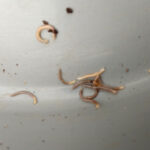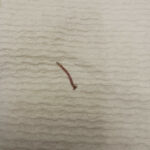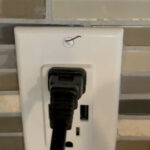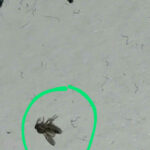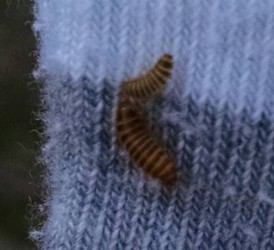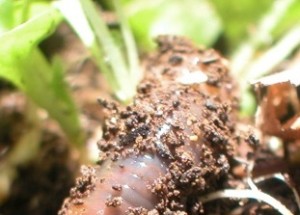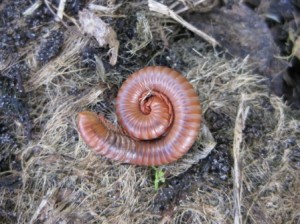
Today we received a question from a reader who is finding lots of millipedes in his basement. Actually, the reader wasn’t sure what he was finding, but the creatures in his basement seem to be millipedes for reasons we will come to shortly. Somewhat unusually, the reader didn’t ask any particular questions about his basement millipedes, nor did he express alarm that there are a lot of millipedes in his basement (he merely described his circumstances), but we presume he is seeking more information. So, the question before us, put in rather informal language, is this: what’s the deal with the basement millipedes our reader is finding?
The reader didn’t submit any pictures along with his question, but in this instance it doesn’t really matter because we are virtually certain he is finding millipedes, an extremely common household pest that we have written about on a number of occasions. In fact, one of our most recent articles was about black millipedes in the house, so they’ve been on our mind as of late. Everything the reader tells us in his email suggests he found millipedes in his basement – they are 20-30 mm (about an inch) in length, they coil up, etc. – but the real giveaway is that the creatures have “a lot of small legs.” To be sure, centipedes also have lots of legs, but they aren’t small; in fact, centipede legs generally extend fairly far from their bodies. In our experience, there are only two creatures that people described as have tons of legs – centipedes and millipedes – and so by process of elimination we think he is finding millipedes.
Again, the reader didn’t express any particular concern with his situation, but we feel compelled to add a couple of remarks about millipedes and their occasional residence in houses. First, their residence is, indeed, occasional, with people generally experiencing an influx of millipedes in the fall or spring. This means our reader is experiencing his basement millipede problem at a somewhat unusual time of year, but perhaps there is an early thaw wherever he lives. (Or we suppose the temperatures might be getting cooler if he lives in a part of the world with seasons opposite to those of the U.S.) In any case, the point is that a lot of millipede problems are temporary. Millipedes will find their way into a house, find it inhospitable, and then dry out and die in just a few days, leaving bodies to be swept away. Compared to the outdoors, houses are generally not particularly good places for millipedes to live since peoples’ homes tend to be dry and (hopefully) lack accumulations of dead organic material, which millipedes feed on. One of the best ways to get rid of millipedes is to ensure your house is not an inviting habitat for them.
As for our reader’s situation in particular, his basement doesn’t sound like a very good place for millipedes to live, as he describes it as dry and well-lit. This is good in the sense that the millipedes won’t stick around for long if he is dealing with a temporary wave, but a little frustrating in that it doesn’t explain why there are millipedes in his house to begin with. Perhaps there is some fairly obvious way that millipedes or other creatures could get into our reader’s house? Often people can solve their worm, insect, or bug problems by doing something as simple as blocking them from getting under the door. Leaky doors generally aren’t a problem in basements, but analogous problems exist for windows and even the foundations of one’s house. It’s amazing what small creatures can crawl through.
Although we didn’t have any guiding questions to answer, we hope that what we have written will be of some help or at least interest to our reader. If he wants to learn more about millipedes, there is plenty of information on this site. He can check out the articles we linked to above or search for millipedes on our site. After he’s done, he probably won’t want to learn anything about his basement millipedes ever again.
All About Worms is always free, always reader-supported. Your tips via CashApp, Venmo, or Paypal are appreciated! Receipts will come from ISIPP Publishing.



